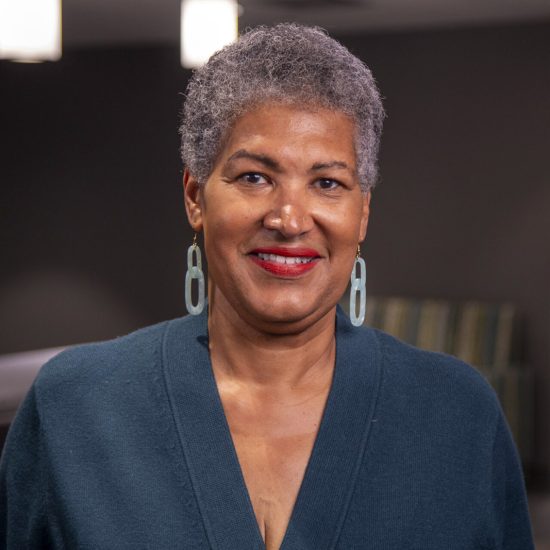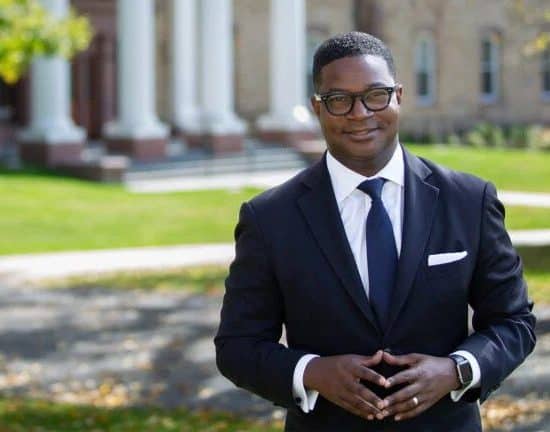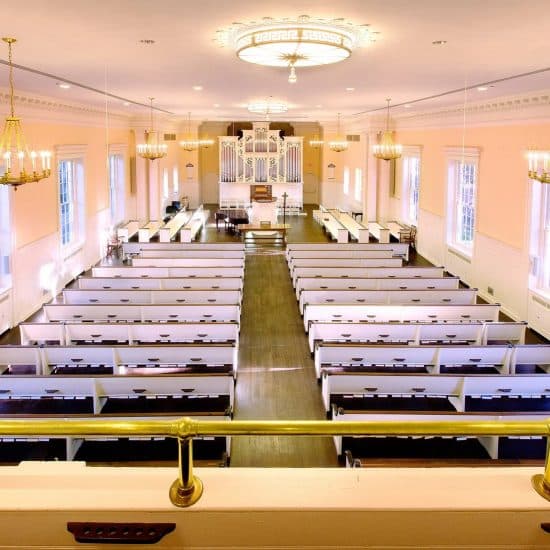KANSAS CITY, Mo. (ABP) — Phil Roberts, the embattled president of Midwestern Baptist Theological Seminary, resigned Feb. 10. No reason was stated, and trustees gave no details about their called five-and-a-half hour meeting at a Kansas City hotel that prompted the 61-year-old to step down.

Robin Hadaway (left), associate professor of missions at Midwestern Seminary, was named acting president of Feb. 10 after embattled President Phil Roberts resigned. Kevin Shrum (right), new chair of the Midwestern Seminary trustees, meets with reporters after the meeting. (ABP photo by Greg Warner)
|
Trustees met behind closed doors in a meeting called specifically to consider Roberts’ job performance, trustees said in a statement released afterward. The start of that meeting was delayed when trustees supportive of Roberts tried to save his job by voting out the trustee officers and committee chairs instead.
That voted failed, the trustees’ three-sentence statement said. Roberts then submitted his resignation, effective Feb. 29. Trustees then “suspended” the special meeting.
Roberts apparently did not attend the trustee meeting but was in contact with them. Afterward, he told the Kansas City Star he was "incredibly honored and pleased to serve this long. He added that he could resign, feeling he had done his best and that he "wanted to leave the seminary united in spirit and purpose."
The board’s executive committee — the officers and committee chairs – reportedly had called the special meeting in part to present a summary of a recent forensic audit that several trustees said uncovered serious financial irregularities.
Roberts is the second president in a row to leave Midwestern Seminary involuntarily. His predecessor, Mark Coppenger, was fired in 1999 for reasons including low employee morale. Sources said Friday’s meeting was the third attempt to terminate Roberts during his 11-year tenure. The most recent, in 2007, was led by the chairman of the trustees at the time.
Trustees named Robin Hadaway, associate professor of missions at Midwestern, acting president.
Despite failure of the attempt to remove the officers, board chairman Wayne Lee of Southlake, Texas, resigned at some point in the meeting. At Lee’s suggestion, trustees elected Kevin Shrum, pastor of Inglewood Baptist Church in Nashville, Tenn., as trustee chair until the board’s next meeting.
The designated trustee spokesperson, Shrum declined to say if trustees took any action on issues raised in the audit or other financial issues. “We’re like any institution with an ongoing need to take care of matters,” he said. Shrum said the seminary “is in a good place” but “always looking to improve our processes.”
Although some of the criticism of Roberts is similar to what surfaced in 2007, the forensic audit added a level of seriousness not seen in previous confrontations. A forensic audit is a detailed inspection of financial records by an outside consultant conducted to the standards of a court of law. Because it must meet judicial-level standards, it raised the possibility of legal ramifications for the administration and/or trustees, who both have fiduciary responsibility for the school under the law.
Before the Feb. 10 meeting, several trustees told Associated Baptist Press that Roberts misled trustees and auditors about the improper use of designated accounts, government grants and other funds at the seminary, which has struggled financially for years.
Trustee leaders said Roberts shuffled money between seminary accounts and misused designated funds in order to mislead trustees, auditors and SBC officials about the school’s true financial status.
Trustee Gene Downing, the chair in 2007, said Roberts has always had a problem misleading the trustees, particularly about finances. “That’s been going on since the day he got there,” he said. “That’s always been the case.”
Improper use of government Pell grants could prove costly if the U.S. Department of Education insists the money be paid back or imposes fines, which could reach $500,000. The DOE reportedly said the seminary’s Fusion program for prospective missionaries should not have qualified for the grants, because too many students dropped out without completing a bachelor’s degree.
The seminary also is reportedly in violation of Southern Baptist Convention regulations that require the school to keep in reserve enough money to cover operating expenses for three months. For Midwestern that would be about $2.5 million.
Additionally, Roberts used seminary funds for trips that some trustees say were personal. He took two trips to Pakistan during which he visited his son. He and his wife went to Africa, trustees said, and he arranged just one opportunity to preach. It was reportedly during that trip that he informed the staff of a 20 percent across-the-board spending cut and one mandatory day off a week without pay.
Not all the problems with Roberts’ leadership are financial, trustees said. The former president was described as a “micromanager” who intimidated or fired employees who disagree with him. The seminary has had 11 chief financial officers during Roberts’ 11 years as president — three in the last 12 months.
Rich Hastings, one of the trustees supportive of Roberts, said he did not believe allegations of intimidation. “I do believe that he has fired people,” Hastings said Feb. 5. "People who have been fired frequently say things that are not true.”
Roberts was elected in 2001 as the fourth president of the Kansas City-based Southern Baptist seminary founded in 1957. He came to Midwestern after seven years at the SBC North American Mission Board and its forerunner, the Home Mission Board, first as director of the interfaith evangelism department and later as vice president.
Roberts taught missions and evangelism at Southern Baptist Theological Seminary and Southeastern Baptist Theological Seminary. He was acting dean of Emmanuel Baptist Seminary and University in Oradea, Romania, 1992-1994, and was a pastor in England, Germany and Belgium.
He is a graduate of Georgetown College in Kentucky and Southern Baptist Theological Seminary. He earned his doctorate from the Free University of Amsterdam. His father, Ray Roberts, was a church planter and the first executive director of the State Convention of Baptists in Ohio.
Roberts is the author of several books, including Mormonism Unmasked and The Counterfeit Gospel of Mormonism.
-30-
Greg Warner is former executive editor of Associated Baptist Press.
Previous story:
Seminary trustees to confront president over audit, management issues






